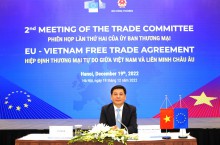The News
Non-tariff measures of the state of Israel
From June 1, 2022, Israel has implemented a new import policy/regime reform program on market opening, removing trade barriers, reducing Israel-specific standards, and applying international standards... for many types of goods, mainly focusing on consumer goods, household goods, furniture, sporting goods, electronic products, kitchenware, materials construction materials, electrical appliances, bicycles, children's appliances, communication and telecommunications equipment...
From June 1, 2022, Israel has implemented a new import policy/regime reform program on market opening, removing trade barriers, reducing Israel-specific standards, and applying international standards... for many types of goods, mainly focusing on consumer goods, household goods, furniture, sporting goods, electronic products, kitchenware, materials construction materials, electrical appliances, bicycles, children's appliances, communication and telecommunications equipment...
1. Commercial Standard
The Israeli Standards Institute (SII) is the only statutory body in Israel that develops and sets standards. Created by an act of the Knesset (Israel Parliament), the “Standards Law 1953” obliges SII to be responsible for the preparation and publication of specifications and standards for products and services produced. domestic export or import. SII combines standardization, testing, conformity assessment, product certification, management system certification and training activities. The institute has laboratories in almost every field of technology, providing inspection and testing services to industry and commerce, as well as legal services to the government. Policy Supervisor SII is the Standards Commissioner of the Ministry of Economy and Industry (officially the Ministry of Industry, Trade & Labor).

The supreme body of SII is the General Assembly, which consists of 70 members from the industries: manufacturing, construction, commerce, services, consumers, technical associations, universities and government. The General Assembly annually elects a Chairman of the Board of Directors.
As the authorized national standards body, SII represents Israel in two international standards organizations, the International Organization for Standardization (ISO) and the International Electromechanical Commission (IEC). SII has also become a branch of the European Commission for Standardization (CEN) and the European Commission for Electrotechnical Standards (CENELEC), although it has not joined any technical committees. Israeli law mandates the application of many international standards to maximize the benefits for Israeli consumers in a competitive market. Historically, Israeli standards policy has had a clear preference for European standards, to the detriment of US products.
2. Standard
The Israel Standards Institute (SII) is the only organization that develops standards in Israel. On an annual basis, SII prepares an action plan that includes a list of the standards it intends to develop. Members of various technical committees, as well as government ministries, set standards.
3. Testing, Inspection and Certification
The Israel Standards Institute (SII) operates product certification programs and product certification systems. Use of the Standards Mark is generally voluntary, but Israeli law requires that certain types of products be certified before they can be placed on the market (The Standards Mark program operates in accordance with EN 45011). To qualify for the Standards Mark, a product must conform to the requirements of the standard or applicable standard and be manufactured in a factory with an approved quality assurance system, similar to ISO 9002.
The Standards Mark Council appoints technical committees of representatives from the public and private sectors in various technology sectors, meeting regularly to review the findings of the test report and the assessment report. quality price.
Once the license is issued, follow-up testing and quality assurance audits are performed. These checks are performed by laboratory staff and auditors. In addition, samples of the product are taken several times a year to ensure continued compliance of the product with relevant standards or standards. To ease the process for foreign manufacturers who want to participate in the Standards Mark program, agreements have been signed with independent foreign certification and testing organizations to perform testing and inspection services. on behalf of SII that SII has signed mutual recognition agreements with foreign organizations.
4. Recognition
The Israel Accreditation and Accreditation Authority (ISRAC) is the only body in Israel, internationally and legally recognized to accredit testing and calibration laboratories to ISO/IEC 17025 and to accredit laboratories tested according to the OECD Good Laboratory Practice (GLP) rules. The Government of Israel issued resolution No. 3778 on 14 August 1994 to establish the National Authority for the Accreditation of Testing and Calibration Laboratories (ISRAC) and empower the Minister of Industry, Trade & Labor to implement this resolution to gain international recognition for their competence in testing. The Law for National Accreditation Authority (ISRAC) was passed in Knesset in May 1997.
ISRAC has accredited laboratories in the fields of food, water, cosmetics, pesticide chemistry, biology, and microbiology as well as many calibration laboratories, engineering, NDT construction laboratories (non-destructive testing/non-destructive testing) and EMC (telecommunications) electromagnetic compatibility lab.
5. Specifications
The technical and revised standards are published in the Government Gazette of Israel (in Hebrew only) in paper form and can be purchased in legal bookstores or by registration with the responsible Commissioner for Standardization. enforcement of mandatory standards. The Standardization Commissioner shall publish the standard for public review and comment within 30 days and the minister concerned 60 days from the date of publication and may be extended for a further 60 days.
6. Israel's Trade Agreements
Israel is a member of the World Trade Organization (WTO). Israel has adopted a free import policy. In addition to the Free Trade Agreement (FTA) with the United States, it also has FTAs with Bulgaria, Canada, Czech Republic, Hungary, Mexico, Poland, Romania, Slovak Republic, Slovenia, Turkey, EU and EFTA (Iceland, Liechtenstein, Norway and Switzerland). In 2011, a trade agreement was signed with the MERCOSUR countries (Argentina, Brazil, Paraguay, Uruguay and Venezuela), and deals with India and China are being discussed. Israel also has a preferential trade agreement with Jordan and maintains a customs union with the Palestinian Authority.
7. Imported restricted items
Israeli consumers are sophisticated and prefer international food flavours. Currently, 16.9% of household spending is spent on food products. Food manufacturers, processors, wholesalers, retailers, food service businesses and food importers are all part of a well-developed agribusiness, contributing to the creation of an internal market. competitive and dynamic location. Israel is not self-sufficient in agriculture and depends on imports. In 2018, agricultural imports reached 6.92 billion USD and about 7% of imports originate from the United States.
With more than 1,800 establishments, Israel's food processing sector is an important player in the domestic economy. Israel's food processing industry is very innovative, constantly introducing new products to the market. Multinational food manufacturers such as Nestlé, Unilever, Danone and Pepsi Co. cooperate with famous Israeli food companies such as Osem and Strauss. Four groups dominate the local food processing industry: Tnuva, Osem-Nestlé, Unilever and Strauss.
In 2017, the annual revenue of Israeli food processors reached $16.75 billion while the annual revenue of the beverage and tobacco industry was $2.2 billion. The sector now accounts for more than 17% of the total revenue of the Israeli manufacturing industry. With limited land and resources, as well as a growing population, the ingredients required by the Israeli food processing industry represent a great opportunity for foreign as well as US exporters of food ingredients. In 2017, Israel imported $2.79 billion in raw food products for the food processing industry.
Israeli importers face two main considerations when choosing a particular product - quality and price. As a price example, US products are not always competitive due to relatively higher manufacturing and shipping costs. Products from Europe and the Mediterranean Basin and Black Sea Basin tend to be favoured by proximity and, in some cases, lower production costs. Shipping costs are less important when dealing with premium products with a very high value-to-volume ratio, such as spices, essences, flavourings, and concentrates/liquids. Similarly, products that qualify for preferential tariffs on trade in agricultural products have a natural advantage, making transportation costs less of a factor.
As the EU is the largest market for Israel's agricultural and food exports, Israel's legal system and standardization of food and dietary supplements are increasingly harmonizing with European standards. In many cases, European standards may differ from those in the United States, resulting in non-tariff trade barriers and challenging import licensing processes.
8. Kashrut/Kosher - Jewish eating laws
Exporters need to consider the issue of Kashrut or Kosher certification. Kosher certification is not a legal requirement for importing food into Israel, with the exception of beef, poultry, and other meats and products. However, products without Kosher certification have a much smaller market share, as most supermarkets and hotels refuse to buy them. In recent years, there has been an increase in demand for non-kosher foods, especially from immigrants from the former Soviet Union. Manufacturers producing Kosher-certified products must be able to meet the requirements of Israel's Jewish supervisors that all components and processes meet Kosher standards. Under the Kashrut Fraud Prevention Act, only the Rabbi of Israel can approve Kosher products for consumption in Israel. The rabbi of Israel can also authorize another supervisory body to act on his behalf. Here, American products have an advantage, as the Kashrut certification issued by many American rabbis is recognized by the Rabbi of Israel. However, it is quite simple for Israeli importers to send a rabbi to any source to certify the product, thus reducing the US advantage.

9. Prohibited Imported Items
Israel, a member of the World Trade Organization (WTO), maintains several bans on agricultural imports. However, Israeli authorities prohibit the import of meat and meat products that are not Kosher certified (including beef, poultry and lamb) under the Kashrut Fraud Prevention Law. As stated above, these products must be certified as Kosher by the Rabbi of Israel. Other product bans only target substances that are controlled by international law or are designed to protect general morality, human, animal or plant health or national security.
10. Labelling requirements
Israel has strict labelling requirements that are often different from other countries. Foreign exporters should consult with Israeli importers before shipping products or goods into the Israeli market. All goods imported into Israel must bear a label stating the country of origin, the name and address of the manufacturer, the name and address of the Israeli importer, the content and the weight or volume in accordance with the measurement standards. In all cases, Hebrew (Hebrew) must be used; English may be added provided that the printed letters are not larger than the Hebrew letters. Nutritional labelling is mandatory on all packaged foods.
Labelling must be done by printing, engraving, stamping, or any other means, on the packaging or the goods themselves. If labelling is not possible, the label must be well-sewn or attached to the goods or packages. Labelling details must be legible, legible and in a different colour from the background so that they can be clearly distinguished. Printing dyes and other labelling materials will not affect the quality of the goods. Labels should not be blurred or indistinct. On a laminated package, the outer layer must be labelled. If the outer layer is transparent, the labelling must be done underneath the layer, as long as it remains clear and legible. On packages containing sub-packages, the labelling must indicate the number of such sub-packages, the core contents of the sub-packages, and the net weight of the entire package. Containers must indicate net weight for semi-solid or powder products and volume units for liquids. For products that tend to lose weight under normal marketing/commercial conditions, the maximum volume of the expected drop should be mentioned.
Specific labelling rules apply to auto parts, certain consumer goods, paper products, bags, music records, fertilizers, pesticides, chemicals, pharmaceuticals, and certain food products, seeds and alcoholic beverages. Outside and inside containers containing dangerous items, such as poisons, pesticides, drugs, flammable goods, ammunition, explosives, reptiles, insects, bacteria, and radioactive materials clearly marked. Foreign exporters should always consult with Israeli importers regarding any additional labelling regulations their products may be subject to.
11. New Updates
From June 1, 2022, Israel has implemented a new import policy/regime reform program on market opening, removing trade barriers, reducing Israel-specific standards, and applying international standards... for many types of goods, mainly focusing on consumer goods, household goods, furniture, sporting goods, electronic products, kitchenware, materials construction materials, electrical appliances, bicycles, children's appliances, communication and telecommunications equipment... According to the Israeli Ministry of Economy and Industry, tens of thousands of types of products and goods are imported into Israel easier and more convenient and reduce costs and administrative procedures, in particular, reduce the standards of Israeli goods (about 80% of goods imported into Israel will not be required to test samples according to Israeli standards), applying international standard practices (about 85% of the standards corresponding to tens of thousands of products will be imported into Israel on the basis of the declaration of conformity with international standards). Israel also announced the implementation of import reform measures applied at the end of July 2022 and will continue to implement them from September 2022, for goods in the fields of medicine, chemicals, and electricity. home appliances and electronics…. As well as will be implemented from January 2023 for items in the group of foodstuffs, chemicals, cosmetics, etc.
On September 28, 2022, Prime Minister Yair Lapid announced that Israel has some major adjustments to the food import market that will take effect on January 1, 2023. Accordingly, Israel is working to bring EU standards to Israel and the Israeli government has made an important decision to apply EU standards since January 2023. The process of aligning standards in Israel to European standards would reduce the cost of living and open up the food market to competition. The Government of Israel will continue to act in the interests of the Israeli people so that they can consume safe, diverse food items at competitive prices.
The Israeli Ministry of Finance said that, after being reviewed by the Israeli Food Standards Review Committee, 97 Israeli food standards will be completely cancelled for Israeli importers and 19 standards will be cancelled “almost completely” in the next four years. Specifically, for domestic manufacturers, out of the 97 standards mentioned above, there are 60 standards to be eliminated on January 1, 2023, 21 standards to be phased out a year later, and 01 standard to be eliminated for the next year and finally, 15 standards are set to be phased out on August 1, 2026. This cancellation will open up the Israeli food market to foreign suppliers and provide a wider variety of food choices for Israeli consumers while tending to lower prices due to international competition. freer market. The abolition of these food standards will facilitate the importation and production of a wide range of products including ice cream, ketchup, tea, dairy products, pasta, rice, crackers, dried fruits, jams, a wide range of frozen vegetable products, condiments, dry soups, mustard, mayonnaise and many more. In addition, the Commission also recommends that the Israeli government accept US and European quality control standards for goods such as honey, olive oil, instant coffee, and roasted coffee and allow It is up to importers and manufacturers to decide which of the above standards to comply with. The 114 existing standards that will be affected represent almost 90% of the 127 food standards that are different from those set by the EU.



